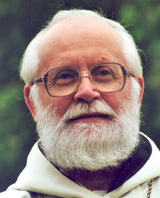 |
|
||
|
|
|||
June 18, 2017 – Solemnity of the Body and Blood of Christ Dt 8, 2…16 ; 1 Co 10, 16-17 ; Jn 6, 51-58 Ávila, Spain – International Encounter of Lay Cistercian Communities
Homily The Gospel text that we just read is the conclusion of Jesus' long discourse on the Bread of Life, that we find in chapter 6 of John's Gospel. At the beginning of that chapter, John narrated the multiplication of the bread, after which the disciples left by boat for the city of Capharnaum, while Jesus, avoiding the crowds who wanted to make him a king went to the mountain to pray before reaching his disciples again. The following day, while the crowds were again coming to him, he addressed to them that discourse on the Bread of Life, the conclusion of which we just read. Actually, the following verse, which our liturgical lectionary omitted, would have been important for us to get a right understanding of the narrative. That verse was : “Those were Jesus' teaching in the synagogue of Capharnaum.
Why is that little verse so important? – Simply because it reminds us that the first and most important meaning of Jesus' words is the meaning they had for the people to whom they were actually directed. Later on, those words will be reinterpreted at the light of the Eucharistic practice; but they were addressed to the great crowd that had followed Jesus to Capharnaum. Jesus does not speak in the future tense. He does not say : “the one who will eat my flesh and the one who will drink my blood”, after my death and my resurrection… No! Jesus is still alive and he says to that crowd, in the present tense: “ Whoever eats my flesh and drinks my blood has eternal life.”
Throughout that discourse, what is at the core is Jesus' message – the message that he has received from his Father and that he brought to the world. “ He who believes has eternal life”. Jesus presents himself as the messenger of the Father. As Son of God, He identifies with the Message, since He is God's Word. But, as Word made flesh, he withdraws before the Message, to the point of emptying himself and making himself obedient unto death.
That moment was indeed a turning point in Jesus' life. Many of his disciples who had followed the young prophet with enthusiasm abandoned him, finding that his message was too hard to bear. It was then that Jesus asked the Twelve : “And you, do you also want to leave me?” and Peter answered : “To whom shall we go? You have the Words of eternal life”.
Many years later, when he wrote his Gospel, John reinterpreted those words of Jesus at the light of the Eucharistic practice, and he showed that what those words meant for those to whom Jesus had addressed them was really the true meaning of the Eucharistic mystery.
When we meet, as we do this morning. to celebrate the Eucharist, we consume the Word of Life that came from the Father and became flesh. We affirm our faith in his message, and by expressing our faith, we are the Church.
Our attitude of adoration before that Message consists in letting it penetrate in us, letting it become flesh our flesh and blood of our blood, so that we may be able to transmit it to the world – to all those with whom we live, those we meet every day, without even trying to be noticed, not even trying to be recognised as messengers, but withdrawing before the Message. As John the Baptist, whom we will celebrate in a few days, let us say : “ He must grow and I must diminish ”.
|
|
||
|
|
|||
